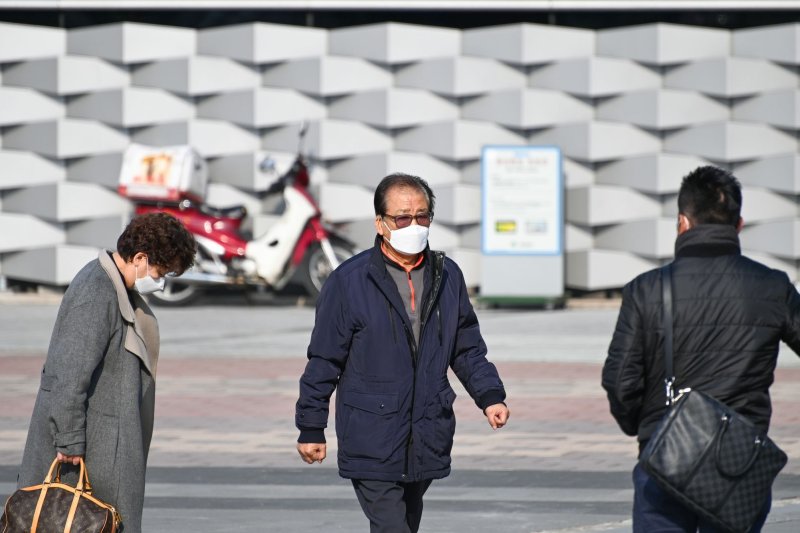South Korea continues to try to contain an outbreak of COVID-19, which is centered in the southeastern city of Daegu, as the number of confirmed cases neared 1,000 on Tuesday. Photo by Thomas Maresca/UPI |
License Photo
SEOUL, Feb. 25 (UPI) -- South Korea continues to struggle to contain an outbreak of the infectious new COVID-19 disease as 144 new cases were reported Tuesday, bringing the confirmed total to 977. The Korean Centers for Disease Control and Prevention also announced new deaths caused by the illness, for a total of 11.
The outbreak is concentrated around the southeastern city of Daegu, with the majority of cases clustered around the secretive Shincheonji Church of Jesus and a hospital in neighboring Cheongdo.
Officials from South Korea's ruling Democratic Party announced Tuesday that they would take "maximum" quarantine steps with "containment" efforts around Daegu and its neighboring North Gyeongsang Province, which led to some speculation that the city of 2.5 million would be locked down.
However, South Korean President Moon Jae-in clarified during a meeting with aides on Tuesday afternoon that there would not be a regional blockade. Moon said authorities are working to "block the spread as much as possible" and vowed that the central government would utilize "national capabilities to win the battle against the virus in Daegu" and North Gyeongsong.
"The government has deployed military and police forces and has launched a nationwide total assistance system, including the support of civilian medical personnel," Moon said. "We will use all available resources to do everything that we can do to help calm things down quickly."
The president added that the government would expedite an additional budget, including special grants and reserve funds, to the afflicted areas to help alleviate the economic fallout from the COVID-19 outbreak.
Since South Korea raised its virus alert to its highest level on Sunday, health officials began testing 28,000 Daegu residents who are exhibiting flu-like symptoms, as well as screening around 9,000 followers of the Shincheonji Church of Jesus in the city, where a 61-year-old woman who is considered a "super-spreader" of the virus attended services before and after exhibiting symptoms.
About 56 percent of all confirmed virus cases in the country are traced to the minor religious sect's services in Daegu, while another 13 percent are tied to a hospital in neighboring Cheongdo county.
The church has agreed to provide health authorities with a list of its roughly 200,000 worshipers and their contact numbers, it announced Tuesday on its website. The church had previously announced that it was voluntarily shuttering all of its 1,100 churches and buildings and suspending services.
Public backlash has grown against the Shincheonji church, with an online petition on the presidential Blue House website demanding that the government forcibly dissolve the sect receiving more than 660,000 signatures by Tuesday evening.
Nearly all major provinces and cities in South Korea have reported cases of COVID-19. Seoul, the capital and the nation's largest city, had 40 confirmed cases as of Tuesday evening, according to the KCDC, while Busan, the second-largest city, had 43 cases.
The United States Forces Korea, the command for the roughly 28,500 U.S. troops stationed on the Korean Peninsula, announced its first COVID-19 case on Tuesday.
In a news release, the USFK said that a dependent living in Daegu, a 61-year-old woman, had tested positive for the disease and had visited Camp Walker, the military base located in Daegu, on two recent occasions. The USFK raised the risk level to "high" for personnel peninsula-wide.
Seoul's city government has stepped up efforts to contain the spread of the disease, staggering work schedules for municipal employees, increasing inspections and banning rallies at three large public squares.
A group of thousands of conservative Christian activists who regularly hold demonstrations against Moon defied the ban over the weekend, however. On Tuesday, Seoul announced it would pursue legal action against 10 of the protest leaders.
An increasing number of countries have been tightening travel restrictions or placing entry bans on South Koreans. Seven countries -- Israel, Hong Kong, Jordan, Bahrain, Nauru, Kiribati and Mauritius -- have barred passengers from South Korea from entering, while another 16 have tightened entry procedures, according to South Korea's Ministry of Foreign Affairs.
The U.S. Centers for Disease Control and Prevention also issued its highest level of travel notice on Monday, recommending that travelers avoid all nonessential travel to South Korea.















